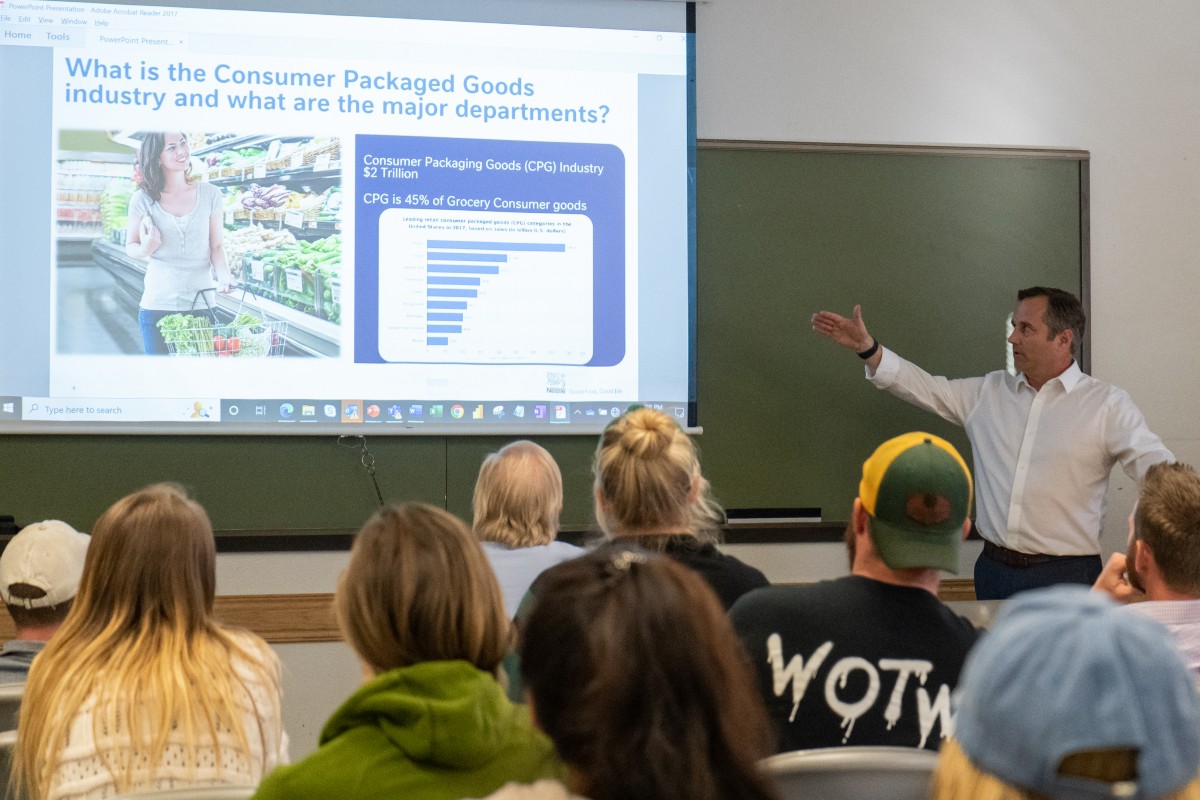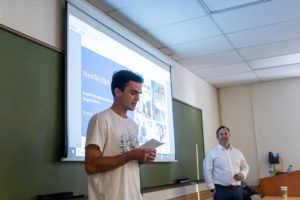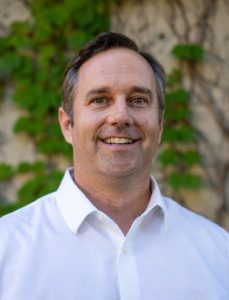
When Brian Stein earned his bachelor’s degree in nutrition and food science from Colorado State University in 2000, the job market was bleak. But his roots in science and his creative business sense set his trajectory for a two-decade career and leadership role in the largest food and beverage company in the world, Nestlé. He shared his experiences with Department of Food Science and Human Nutrition students, faculty, and staff at a guest lecture on October 24.
‘Everyone needs to eat’
Stein expressed gratitude for his foundation in science and nutrition, and for his faculty mentor, Professor Chris Melby. “Thanks to CSU for putting me on my pathway,” he said. “This degree offers you lots of opportunities,” Stein told the students.
Chris Gentile, department head of food science and human nutrition, echoed Stein’s endorsement of a food science degree, adding, “A degree in food science provides students with excellent training in the basic sciences that prepares them for a number of very well-paying jobs in the food industry. Brian’s success since leaving CSU is a testament to this.”

Stein impressed lecture attendees with the scope of the consumer packaged goods industry. “Everyone needs to eat,” Stein said, and explained that the industry’s annual $2 trillion market comprises 45% of grocery consumer goods, including categories like home care, health and beauty, frozen, refrigerated, and other packaged foods, as well as liquor and other beverages.
After graduating, Stein’s first job in the consumer package goods industry was at Contessa – an imports business and seafood company responsible for brand development for retailers like Trader Joe’s and Kroger. He spent two years working with celebrity chefs; his role was to optimize moisture retention in shrimp for frozen meals.
Nestlé Global recruited Stein to launch new items and bring them to market. Over the past 19 years, he has grown with Nestlé to run the account team for the west coast, working with Albertson’s and Safeway supermarkets. He currently leads a team of 10 who generate $350 million in sales per year.
From concept to market

Throughout his career, he has been a part of many aspects of product development. “Products don’t magically land on shelves,” Stein said. He began his career at Nestlé Global in Denver as a product development food scientist, where he tested innovative product concepts being developed for mass production and marketing. Since then, his journey with Nestlé has taken him to roles in business analytics, account management, strategy development, and retail sales in locations including Arkansas, Ohio, Texas, and, for the last seven years, California. Along the way, Stein earned an MBA from Texas A&M in 2015.
Stein’s CSU education as a food scientist set him up for a variety of career opportunities within Nestlé Global. “A foundation in the sciences helps you be more successful in technical sales,” he explained. Nestlé Global is the largest food and beverage company in the world. The company reported $93 billion in sales in 2021, 413 factories in 85 countries, more than 2,000 brands, and 29 billion products sold per year.
Advice for students
Stein promoted his employer as a terrific opportunity for internships and careers for CSU graduates. Nestlé has a high success rate in building a pipeline of employees with partner institutions that provide student interns. In fact, Stein cited that roughly 90% of people who complete an internship at Nestlé go on to full-time employment. Nestlé’s Innovation Lab has developed partnerships with several higher education institutions, and Stein is eager to ensure that CSU students and alumni have opportunities for internships, apprenticeships, independent studies, research, and employment after graduation.
Gentile added, “Providing our students with hands-on and real-world experience is absolutely essential to prepare them for their future careers. We’re incredibly grateful for Brian’s support of our program and excited about building a strong partnership with Nestlé.”
Macrotrends influence consumer purchasing, Stein explained. Students who focus on priorities like health, social responsibility, and shifting demographics can position themselves for rewarding careers. Putting consumers at the center of product success means Stein focuses on top consumer priorities, including taste, convenience, value, and health.
Stein shared insights about current headwinds in the consumer packaged goods industry. Like many industries, it is impacted by supply chain constraints. As markets and consumers shift with the pressures of inflation, companies must adapt to keep their products competitive in the marketplace. Recruiting creative talent to address economic challenges is a priority for Nestlé, and Stein is eager to showcase his alma mater as a source for emerging professionals with valuable ideas.
Diverse opportunities
Stein spoke to the diversity of roles and opportunities for growth offered by a global employer like Nestlé. With a background in fields like nutrition and food science, new graduates can make a difference in projects like improving plant and product efficiencies; negotiating with supply vendors; reducing costs through sourcing and formulation changes; managing quality assurance; improving product quality through consumer feedback and testing; developing concepts with marketing for new product launches; and creating and testing manufacturing processes in collaboration with industrial engineers.
In addition to a diversity of roles and projects, Stein spoke about the diversity of identities represented among Nestlé’s 323,000 employees in 189 countries. The company encourages involvement in Employee Resource Groups that cross divisions and encourage in-person and virtual engagement with identity-affirming communities of colleagues.
Stein advised students to be adaptable and open-minded as they approach their careers. “If you’re narrowly focused, you will miss opportunities that are a better fit for you. You need to have an agile mindset. Seek out opportunities to better develop yourself.”
The Department of Food Science and Human Nutrition is a part of CSU’s College of Health and Human Sciences